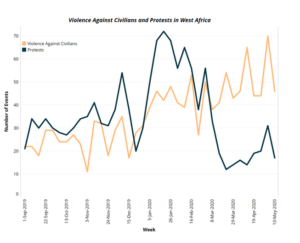Since the onset of the pandemic, analysts have predicted that COVID-19 will significantly impact political violence and demonstration activity in the region. Some fear competition over basic needs, others see fewer protests and demonstrations, and yet more claim that international crisis management systems and peacekeeping missions will be handicapped, allowing armed groups to exploit the situation. Many believe that state authorities will use new-won powers to reassert control and conveniently address political problems.
The problem is that these remain unproven hypotheses. For example, analysts warned of increased Islamic State in the Greater Sahara (ISGS) activity in the Sahel, but in reality the region has seen a drop in ISGS attacks. Unclear violence patterns leave policymakers in the dark as to how to respond. Certainly, ‘smart responses’ that account for uncertainty are important. But above all they need empirical evidence.
Data show an increase of COVID-19-related violence against civilians by state forces, and governments have suppressed opposition and manipulated elections
A review of available conflict data highlights that COVID-19 has strengthened the role of the West African state. The data show an increase of COVID-19-related violence against civilians by state forces. Moreover, the data reveal how governments (e.g. Guinea, Sierra Leone, Côte D’Ivoire, Togo, Benin) have used COVID-19 to alter the role of the opposition and manipulate upcoming elections.
„States, Not Jihadis, Exploiting Corona Crisis in West Africa“

